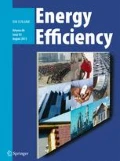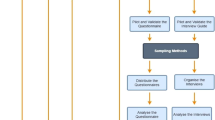Abstract
The energy efficiency services sector is an increasingly important part of the global economy, with an increased need for trained evaluators to foster energy efficiency program accountability and improvement. Organizations are experiencing difficulty in finding people who are knowledgeable about and experienced in the evaluation of energy efficiency programs. Accordingly, there is a need to assess the training needs of the energy efficiency evaluation community (for both new and “experienced” evaluators). This paper presents the results of a recent survey conducted by the International Energy Program Evaluation Conference (IEPEC) on energy efficiency evaluation training needs and contrasts those findings with the findings from a survey conducted by the American Evaluation Association on young evaluators (those people in the field <5 years) and another by the Association of Energy Services Professionals. This analysis is also complemented by a brief survey of members of the 2012 Rome Conference IEPEC Planning Committee on international needs.








Similar content being viewed by others
Notes
This statement is not based on a scientific survey or analysis, but on informal discussions with experts and practitioners in the field of energy efficiency evaluation (Khawaja 2012; Rosenberg 2012; Violette 2012). In fact, this problem seems to be more challenging for the evaluation community than the rest of the energy efficiency industry: after the regulated energy efficiency industry as a whole declined from 1995 to 2005, people with evaluation skills migrated out of the field and none came in to replace them (Rosenberg 2012). As a result, most consulting firms specializing in the evaluation of energy efficiency programs are hiring young, smart, enthusiastic, and inexperienced staff and conducting their own in-house evaluation training (Cooney 2012; Peters 2012; Violette 2012; White 2012).
The online method was chosen due to its lower cost (compared to mail or phone), the format of the database (already formatted for e-mail; phone numbers and postal mail addresses were lacking for most people on the list), and because all of the people on this list had access to the Internet.
Potential candidates for the proposed training would generally be limited to those involved with energy efficiency programs, so that is why the survey was sent to IEPEC e-mail addresses. Evaluators in the education field, for example, would likely have limited interest in studying energy billing analysis techniques.
These topics were a subset of a longer list of evaluation topics that the IEPEC Education Subcommittee chose to be on the survey.
One respondent suggested http://homeenergypros.lbl.gov as a social site to add evaluation threads and blogs.
The AEA is an international professional association of evaluators devoted to the application and exploration of program evaluation, personnel evaluation, technology, and many other forms of evaluation. For more information, go to www.eval.org. The survey results were not available, but highlights of the survey were drawn from Robinson (2011).
The last principle is one that is closely followed by energy program evaluators as they are often required to be responsive to various guidelines and requirements of policy makers and regulators for conducting evaluations.
References
AEA (American Evaluation Association). 2004. Guiding principles for evaluators. Retrieved from www.eval.org. Accessed 24 Feb 2012.
ASHRAE (American Society of Heating, Refrigerating, and Air-Conditioning Engineers). 2010. “Determining Energy Savings from Performance Contracting Projects—Measurement and Verification” training course. Retrieved from www.ashrae.org. Accessed 24 Feb 2012.
AESP (Association of Energy Services Professionals). 2010. “Principles of Research and Evaluation” training course. Retrieved from www.aesp.org. Accessed 24 Feb 2012.
Bensch, I., Skumatz, L., & Titus, E. (2006). Evaluators look in the mirror: AESP/IEPEC survey on hot topics and industry perspectives. Proceedings of the 2006 ACEEE Summer Study on Buildings. Washington, DC: American Council for an Energy Efficient Economy.
Cooney, K. Navigant Consulting, 25 April 2012, personal communication.
EVO (Efficiency Valuation Organization). 2010. “Certified Measurement and Verification Professional Certification” and “Fundamentals of Measurement & Verification: Applying the New IPMVP” training courses. Retrieved from www.evo-world.org/index.php?option=com_content&task=view&id=278&Itemid=337. Accessed 24 Feb 2012.
Goldman, C., Fuller, M., Stuart, E., Peters, J., McRae, M., Albers, N., Lutzenhiser, S., & Spahic, M. (2010). Energy efficiency services sector: workforce size and expectations for growth. Berkeley, CA: Lawrence Berkeley National Laboratory.
Khawaja, S. The Cadmus Group, 25 April 2012, personal communication.
Mathison, S. 2011. Editor’s notes. In S. Mathison (Ed.), Really new directions in evaluation: young evaluators’ perspectives. New Directions for Evaluation, 131, 1–5.
Patton, M. (2010). Developmental evaluation: applying complexity concepts to enhance innovation and use. New York: Guilford.
Peters, J. Research Into Action, 25 April 2012, personal communication.
Robinson, S. (2011). Inside, outside, upside down: challenges and opportunities that frame the future of a novice evaluation. In S. Mathison (Ed.), Really new directions in evaluation: young evaluators’ perspectives. New Directions for Evaluation, 131, 65–70.
Rosenberg, M. DNV KEMA, 25 April 2012, personal communication.
Vine, E. N. Hall, K. Keating, M. Kushler & R. Prahl. (2010). Emerging issues in the evaluation of energy efficiency programs: the US experience. Proceedings of the 2010 International Energy Program Evaluation Conference. Paris, France.
Violette, D. Navigant Consulting, 25 April 2012, personal communication.
White, C. National Grid, 25 April 2012, personal communication.
Acknowledgments
The following people were very helpful in creating this paper: members of the IEPEC community and the 2012 Rome Conference IEPEC Planning Committee who responded to the surveys, Sam Braithwait and her colleagues who managed the survey, and Mary Sutter and the reviewers who commented on an earlier draft. The authors thank the reviewers of an earlier draft of this paper for their helpful comments for improving this paper.
Author information
Authors and Affiliations
Corresponding author
Rights and permissions
About this article
Cite this article
Vine, E., Saxonis, W., Peters, J. et al. Training the next generation of energy efficiency evaluators. Energy Efficiency 6, 293–303 (2013). https://doi.org/10.1007/s12053-012-9177-3
Received:
Accepted:
Published:
Issue Date:
DOI: https://doi.org/10.1007/s12053-012-9177-3




